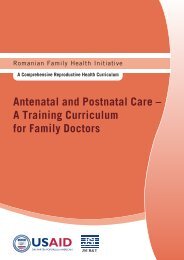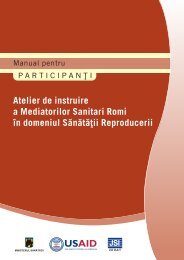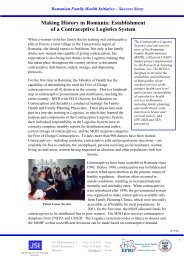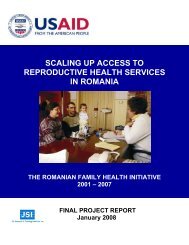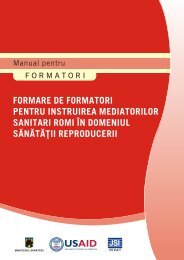Training of Roma Health Mediators in Reproductive Health
Training of Roma Health Mediators in Reproductive Health
Training of Roma Health Mediators in Reproductive Health
Create successful ePaper yourself
Turn your PDF publications into a flip-book with our unique Google optimized e-Paper software.
Possible <strong>in</strong>terventions at each stage <strong>of</strong> behavior change (or resistance to behavior change)<br />
Stage 1: There is no problem.<br />
Provide an example <strong>of</strong> a similar reproductive health problem <strong>in</strong> this or a nearby community.<br />
Engage the woman <strong>in</strong> discussion <strong>in</strong> order to help her to become more aware <strong>of</strong> the problem.<br />
Possible discussion questions:<br />
1. What problem does this person have?<br />
2. Do you know anyone this has happened to/who has had this problem?<br />
3. Has it ever been a problem for you? In what way? What did you, or could you, do<br />
about it?<br />
Stage 2: There may be a problem but it is not my responsibility. (It is the responsibility <strong>of</strong> God, <strong>of</strong><br />
government, <strong>of</strong> someone else.)<br />
Use proverbs and analogies to help people identify why the situation is a problem.<br />
Possible discussion questions:<br />
1. Why is this (the situation presented) a problem?<br />
2. What do you know about this problem?<br />
Stages 3 & 4: There is a problem but:<br />
a. I am not conv<strong>in</strong>ced <strong>of</strong> the proposed solutions.<br />
b. I am afraid <strong>of</strong> chang<strong>in</strong>g because <strong>of</strong> fear <strong>of</strong> possible negative consequences.<br />
Bra<strong>in</strong>storm with the woman/women to identify all possible solutions & pros & cons <strong>of</strong> each.<br />
Possible discussion questions:<br />
1. What are the different alternatives for cop<strong>in</strong>g with/overcom<strong>in</strong>g this problem?<br />
2. Which alternatives seem most realistic, the most feasible for you?<br />
3. What more would you like to know about "x" alternative?<br />
Stages 5 & 6: I see the problem and would like to learn more about it; I am ready to try to change.<br />
Discuss family plann<strong>in</strong>g methods and services <strong>in</strong> order to provide the necessary <strong>in</strong>formation<br />
so that <strong>in</strong>dividual can act.<br />
Possible discussion questions:<br />
1. What do you know about the different methods <strong>of</strong> contraception? "x" method?<br />
2. What do you th<strong>in</strong>k about the different methods <strong>of</strong> contraception? "x" method?<br />
Ask these 2 questions <strong>in</strong> relation to each method <strong>in</strong> order to assess the level <strong>of</strong> knowledge,<br />
attitudes, preferences and rumors.<br />
Stage 7: I am will<strong>in</strong>g to demonstrate or propose the solution to others.<br />
Ensure follow-up. Support the <strong>in</strong>dividual <strong>in</strong> her family plann<strong>in</strong>g decisions.<br />
Possible discussion questions:<br />
1. How has your experience been with "x" family plann<strong>in</strong>g method? Have you had any<br />
problems?<br />
2. What can we do to help others to benefit from family plann<strong>in</strong>g ?<br />
202<br />
RFHI/JSI <strong>Roma</strong>nia <strong>Tra<strong>in</strong><strong>in</strong>g</strong> <strong>of</strong> RHMs <strong>in</strong> <strong>Reproductive</strong> <strong>Health</strong> Session 13: BCC



